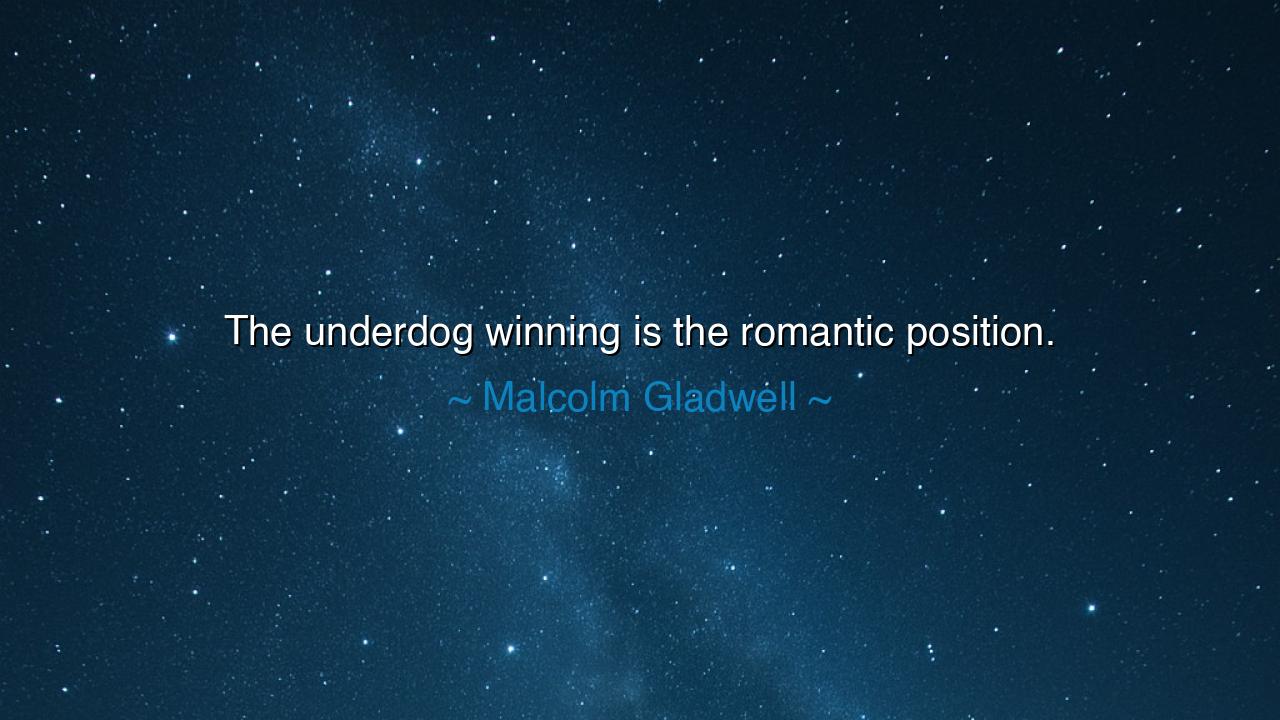
The underdog winning is the romantic position.






“The underdog winning is the romantic position.” Thus speaks Malcolm Gladwell, unveiling a truth that has captured the human heart since the dawn of story. For there is something irresistible about the underdog—the one dismissed, underestimated, cast aside as weak or unworthy—who rises against the odds to claim victory. Gladwell calls this the romantic position, because it stirs not only admiration but longing, reminding us that greatness may spring from unexpected soil, and that even the smallest may overcome the mighty.
The ancients told this tale again and again. The legend of David and Goliath remains the eternal example: a shepherd boy, armed not with armor but with courage, faced the towering warrior who terrified armies. Reason declared David’s defeat inevitable, yet faith and daring carried his stone straight to the giant’s brow. This story endures because it is not merely about battle—it is about hope, the conviction that the weak can triumph when heart and vision are on their side. In this victory lies the essence of romance: the beauty of the impossible made real.
Gladwell’s insight reveals why such tales are cherished. The powerful winning is expected, but the underdog’s victory is a disruption of fate, a rewriting of the order of things. It is a reminder that the world is not governed only by strength or wealth, but also by resilience, cunning, and spirit. This is why audiences cheer louder for the overlooked fighter than for the reigning champion, why the humble beginnings of heroes inspire more than the polished triumphs of kings.
History offers us countless examples. Recall Joan of Arc, a peasant girl who rose from obscurity, armed not with noble birth but with vision, to lead armies and inspire a nation. To the rulers of her time, she was nothing—a poor girl, unfit for command. Yet her courage lifted France from despair, and though her life ended in flame, her story became immortal. She remains the ultimate romantic underdog, her victory spiritual as much as military, her triumph echoing far beyond her years.
There is also a deeper reason the underdog’s triumph stirs us. It mirrors the struggles of our own lives. Few of us are born giants; most feel small against the vastness of the world. To see the weak prevail gives us courage to rise against our own odds, to believe that even when outnumbered, outspent, or outmuscled, we may yet endure and overcome. The underdog embodies the dream of justice—that the last shall be first, and that hope is stronger than despair.
Yet let us not forget: the romance of the underdog does not come without suffering. To be underestimated, to struggle, to fail and rise again—this is a hard road. But it is precisely this hardship that makes the victory so beautiful. The mighty who win add little to the world’s song, but the humble who prevail compose music that generations remember. Their victories feed the soul, because they show us what is possible when all reason says it is not.
The lesson, then, is clear: embrace the position of the underdog when life places you there. Do not despair in being overlooked or underestimated, for this may be the very soil of greatness. Let your struggle shape you, let your disadvantages become your weapons, and when your time comes, strike with the courage of David, the vision of Joan, the resilience of all who rose from nothing. For the world loves the underdog not because they always win, but because when they do, their triumph becomes eternal—an act of romance, of beauty, of hope against despair.
Therefore, beloved seeker, remember Gladwell’s wisdom: to be the underdog is not shameful, it is sacred. It is to walk the path of heroes, to carry within you the possibility of miracles. And when victory comes, it will not only belong to you, but to all who dream that the small may yet overcome the great. In this lies the eternal romance of the human spirit.






AAdministratorAdministrator
Welcome, honored guests. Please leave a comment, we will respond soon